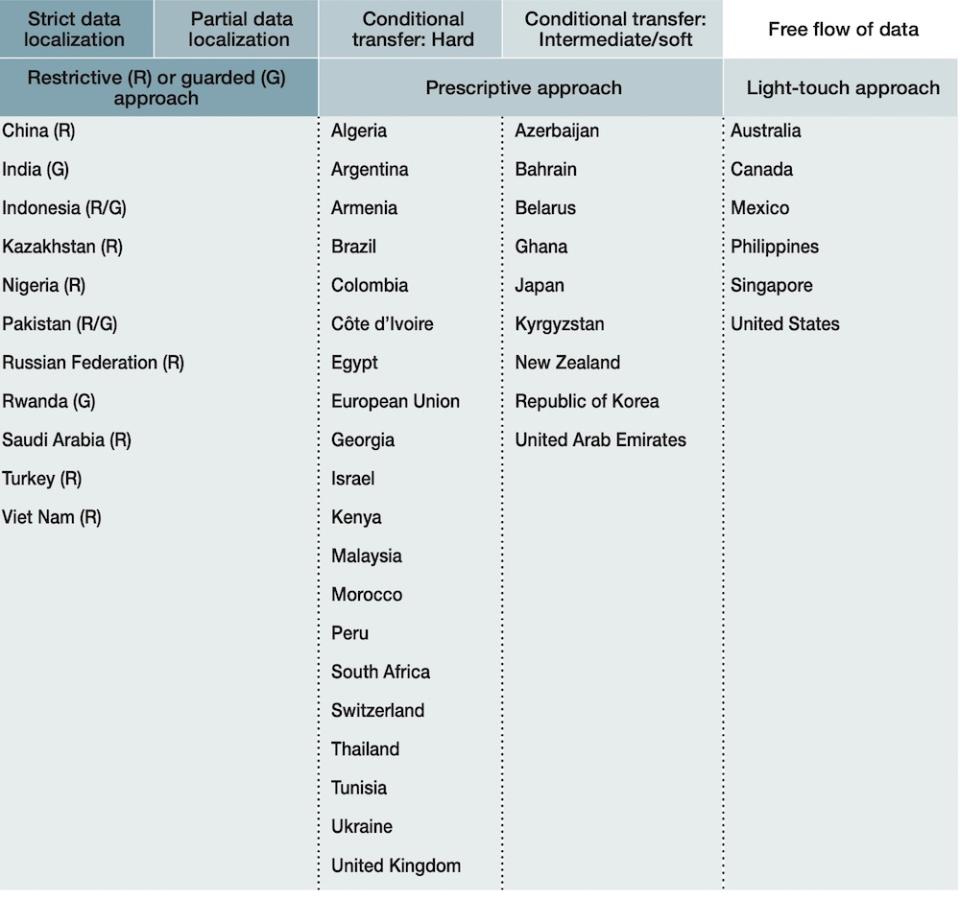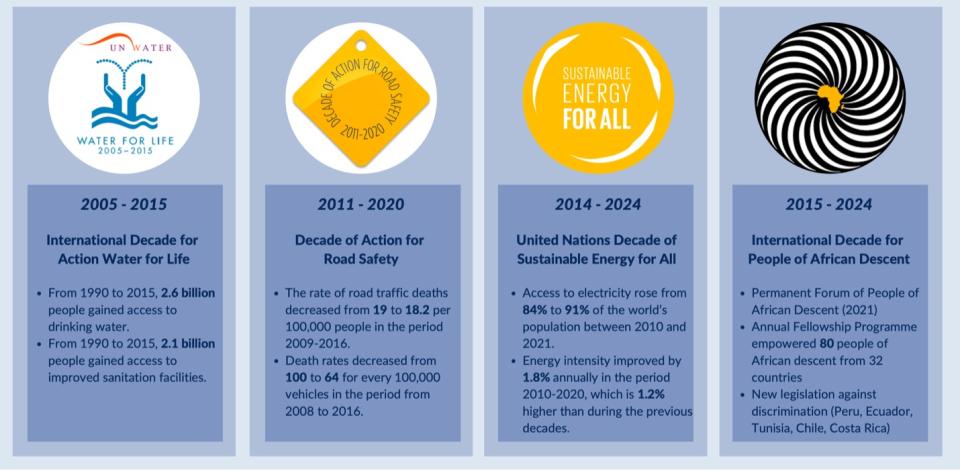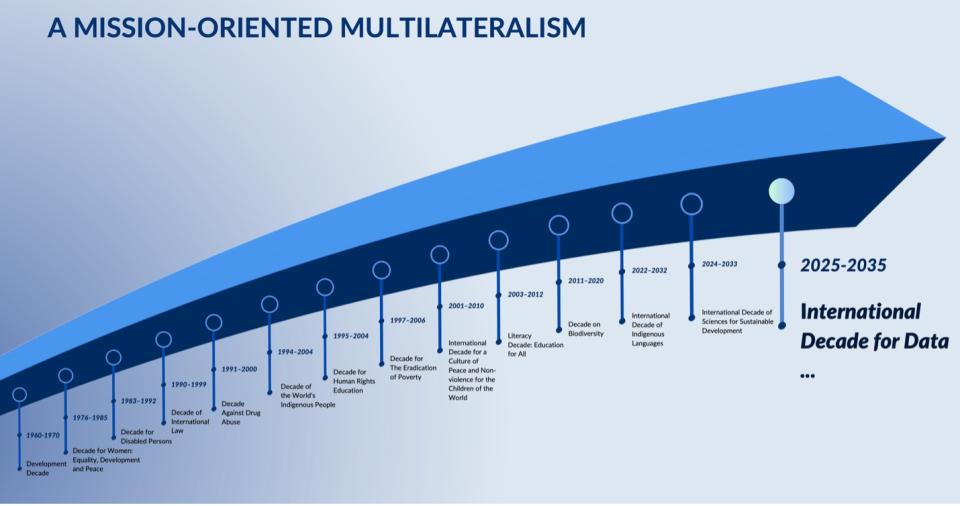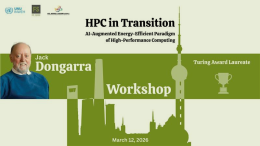In his first speech as United Nations Secretary-General, António Guterres summarized his priorities in three words: “prevention, prevention, prevention.” We might look back on this time and reinterpret his priorities as “data, data, data.”
Not long after Secretary-General Guterres took office, the UN was confronted with a global health crisis. Data drove statistical modelling in COVID-19 research, informed global health guidelines, and was relied upon to measure and determine everything from ideal global supply routes for Personal Protective Equipment, to the number of guests allowed at events. On the heels of the pandemic, global debt levels skyrocketed. The UN called for, among other things, more data to support debt transparency and debt workouts. The pandemic and new regional conflicts saw worrying increases in misinformation and disinformation. Again, the call was for greater transparency, monitoring and accountability supported by better data governance. The Artificial Intelligence revolution is just another milestone in a series where the UN has focused its efforts on the benefits and harms of data use.
A recent UN study notes that while “data has become a critical resource … it is not always as valuable as it could be, since there is no well-defined approach to managing and using it.” Efforts to govern, share, and re-use data remain fragmented, and limit our ability to predict and respond to hazards, measure poverty and vulnerabilities, and anticipate changes to the natural environment. The Secretary-General’s focus on data is warranted.
Data has tremendous potential: it can stimulate development, improve ownership of and innovation in new technologies, and minimize inequalities. To realize this potential, the UN and its Member States must have effective platforms for multistakeholder cooperation. These platfoms must be driven by a common cause: they should aim for the widest possible distribution of data benefits, while reducing harms arising from irresponsible or deliberate misuse of data.
Some progress has been made in recent years. Regional data initiatives like the European Union’s General Data Protection Regulation (GDPR), and proposals from ‘minilateral’ coalitions (for example the G7 and G20) are leading the way, promoting interoperability by accelerating the adoption of common data governance principles. These initiatives reflect the values, priorities, and capabilities inherent to specific geographies, as well as their industries and policymaking communities. These initiatives are stepping stones to greater global coherence in the data policy landscape, but are not sufficient.
This is a time for greater ambition
A new sense of urgency is required to ensure we do not miss or lock away the benefits of the data century. We need a global vision for data cooperation that can stimulate international investment, bridge capacity gaps between developed and developing nations, leverage specialist expertise in the private sector, and reduce barriers to data sharing. As noted in a recent UN policy paper, “bringing consistency to the data policy landscape is an enormous task that will require collaboration between all States.”
This challenge can be tackled within the next year.
In 2024, UN Member States will have a unique opportunity to articulate a vision of global data governance. They will come together over the next 11 months to negotiate a Global Digital Compact, a global handshake on norms, principles, and actions to safeguard digital development and harness its potential for the public good. We argue here that the Global Digital Compact can be the launch point for an ‘International Decade for Data’ covering the period 2025–2035. This international decade represents a global commitment to improving consistency and coherence in the data policy landscape.
Capitalizing on the Data Opportunity
Frameworks that support safe and systematic data sharing are needed to support economic transformations in developed and developing countries; facilitate analysis for preparedness, planning, and prevention; and more generally support innovation and the delivery of global public goods. Data sharing and re-use is especially important in a crisis-prone world, and will play a key part in minimizing future risks.
There is no shortage of examples that illustrate the benefits of pooling and sharing data – it helps prepare for and respond to catastrophic weather events, improves understanding and prediction of mass population movements, and keeps different private and public actors accountable. It is also an engine of economic growth. The International Monetary Fund describes data as a key input in modern economic production alongside land, capital, labour, and oil. Value is generated by reducing information asymmetries, improving efficiency, enhancing predictability, and through new services developed by data-driven companies, e-commerce, or social welfare organizations.
What we have not yet done is harness data at scale, make them globally accessible and use them to inform national and international development plans and programmes as well as public-private partnerships, e-commerce, technological entrepreneurship and capital investments.
We acknowledge that data can also be misused to undermine these goals. Data has been manipulated to fuel conflict, hasten division, and undermine public trust in science. There are also legitimate concerns that poorly regulated data flows will compromise basic human rights, bias major technology leaders over new market entrants (economic rents generated through data monopolies reduce competition and economic opportunity), and undermine legitimate political processes.
The deployment of sophisticated AI systems was a sudden, surprising development for most people. AI systems trained on mass data sets give us the ability to interact with and manipulate information in remarkable new ways. This has sparked a wave of innovation – see, for example, the advances in synthesis and modelling of RNA-protein interactions and other advances in the life sciences. However, it also facilitates new harms, such as the ability to create deep fake videos in minutes through a process so simple that it is contributing to a doubling of harmful deep fake videos every six months. New AI technologies have exposed a significant divide between those that are able to harness data for public interest or economic gain and those that lack the access and capacity to do so.
Diversity in data governance
The lack of coherence in the data policy landscape has several root causes: (i) diversity in State priorities and values; (ii) uneven public sector capacity; and (iii) the absence of a global vision.

Public sector policymakers have struggled to anticipate these challenges and define incentives to overcome them. This is in part due to the rapid pace of change in the technology sector. It is also symptomatic of under-investment in public sector capacities.
Africa lags considerably behind in its statistical capacity and ability to use data for decision-making. There are diverse reasons for this – brain drain, underinvestment, and infrastructure deficits, among others. Indeed, while there are growing data and innovation hubs in many parts of Africa, there is still only one data scientist in Africa for every 14 in the Global North. This under-investment is widespread and affects public administrations in advanced economies too. However, in the latter cases, we are seeing rapid and sizeable corrective investments in the form of new programmes to build digital talent in the public sector. Several countries (Singapore, Canada, the United Kingdom) have launched digital academies to ensure that public administrations are not left on the sidelines of the digital revolution.
The United Nations took several years to develop a consistent position on the issue of data governance, but recent UN initiatives signal a decisive policy pivot in the Organization. The UN is not only improving data sharing and analysis within the Organization, but also beginning to offer normative guidance for the international community.
The Secretary-General committed in his UN 2.0 strategy to upgrade skills, approaches, and understanding of data with a view to improving how the UN collects, handles, governs, and uses data from more diverse sources for better insights and action. This vision of a retooled multilateral system builds on an earlier UN data strategy released by the Secretary-General in 2020 with the goal of generating more value from the UN’s wealth of data. The Complex Risk Analytics Fund (CRAF’d) is yet another example of UN innovation. The CRAF’d initiative strengthens the quality of data-derived insights by translating risk information into effective crisis action that better aligns anticipatory, prevention, and recovery responses to complex risks in fragile and crisis-affected settings.
More recently, the UN Chief Executives Board for Coordination – a gathering of UN agency and programme heads convened by the UN Secretary-General – endorsed a common position for the United Nations on the topic of data governance. In the International Data Governance - Pathways to Progress report, the UN calls for an international, multi-stakeholder process that can build toward an international data governance mechanism, such as a global data compact. The paper offers several pathways to achieve this objective. What follows is a complementary action the international community can take to support efforts in this direction.
A Vision for Multi-stakeholder Collaboration: the International Decade for Data
An International Decade for Data can increase awareness and collaboration in the data policy landscape. Distinct from mandated institutions or treaty-making initiatives, the UN has used international decades to promote coordination between States, the private sector, technical and scientific communities, academia, and civil society organizations on specific issues of global concern. As of 2023, the UN has implemented 52 international decades on a variety of issues, ranging from road safety to disaster risk reduction.

International decades affirm commitment to action and coordination in areas that do not benefit from sufficient international attention or where coordinated action is essential to advancing a global goal. Notable successes were registered during the International Decade for Women (1976-1985), the International Water for Life Decade (2005-2015), and the International Decade for Deserts and the Fight against Desertification (2011-2020).
| Issue | Years | Achievement |
|---|---|---|
|
International Decade for Women |
1976-1985 |
Shed visibility on women's unpaid labour by increasing the collection of gender-based data. Increased awareness of women's health globally, particularly as it relates to maternal mortality. Reshaped traditional approaches to development by adopting a gender-based perspective, accounting for the needs and aspirations of women affected by development projects. Contributed to the eventual establishment of the United Nations Development Fund for Women in association with UNDP. |
|
International water for Life Decade |
2005-2015 |
Halved the proportion of people without access to safe drinking water by 2010. Led to the United Nations General Assembly recognizing access to water and sanitation as a human right. Contributed to the development of an SDG target dedicated specifically to ensuring the availability and sustainable management of water and sanitation for all. |
|
International Decade for Deserts and the Fight Against Desertification |
2011-2020 |
Led to the development of the framework of land degradation neutrality. It was included as a central theme of the SDG15 target by achieving land degradation neutrality by 2030. Improved scientific knowledge about the drivers and processes of desertification. Delivered progress on the development of technical solutions to address these issues. |
An International Decade for Data can build on the momentum generated by existing data governance initiatives such as GDPR, the Data Free Flow with Trust (DFFT) initiative launched by the Government of Japan, and the UN Chief Executives Board for Coordination’s call for a global multilateral framework for data governance. An international decade would create space for convergence on difficult issues of definition, scope, or regulatory application, and support progress on nexus challenges, such as rights-respecting data frameworks, the effective management of synthetic data, and public and private sector data sharing.
International decades are also a unique way to address global challenges. An International Decade for Data promotes networked cooperation, incentivizing partnerships and networks by efficiently directing resources towards common goals, including the elimination of capacity and information gaps. International decades represent a visible, stable platform for regular, systematic information sharing over the medium term. The ten-year time horizon results in greater cooperation by identifying issues of common concern and leaving sufficient time to work out solutions through an iterative engagement process. The high degree of multi-stakeholder cooperation is a hallmark of previous international decades. It was key to the success of the International Decade on Water Supply and Sanitation (1981-1991), the International Decade for Natural Disaster Reduction (1990-1999), and the Water for Life Decade (2005-2015).
The sudden surge in AI regulation and policy increases the urgency of an International Decade for Data. Many AI risks and opportunities will be addressed in global governance initiatives focused on data – training data, data security, and data sharing, among others. The more regulations, principles, forums, and governance frameworks multiply, the harder it will be for small public administrations and small companies to navigate the new data policy landscape. To constructively contribute to emerging data governance frameworks, they will need a space that promotes open dialogue and trust. The International Decade for Data can provide this space, while also serving as a testing ground (a sandbox) for innovative approaches to collaboration.
Economists extoll the virtue and value of mission-oriented economies. A State that sets clear goals in support of an ambitious mission can more productively steer resources and partners to achieve high-impact outcomes. The Apollo Mission is frequently taken as an example of effective multi-sectoral cooperation that embraced innovation, experimentation, and organizational dynamism. Backed by considerable public and private investment, it generated positive spillovers for the public and private sectors and gave humanity its first glimpse of the earth, which led to a profound shift in environmental and social consciousness. An International Decade for Data can provide a mission orientation for the international community, and create space for accelerated action and ownership by all stakeholder groups underpinned by a common commitment to improving consistency and coherence in the data policy landscape.

The case for coordinated action on data is clear. In a time of geopolitical rivalry and fragmentation, multistakeholder collaboration on data governance can provide an opportunity for the UN and the international community (including the private sector, civil society, technical and standards communities, academia, local governments, among others) to reassert the value of effective multilateral cooperation. The International Decade for Data is a realistic and achievable aspiration for the 2024 Global Digital Compact. If adopted, the 2024 Summit of the Future will launch a transformative decade for global data governance.




